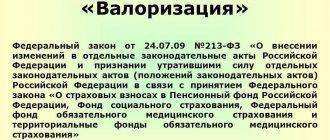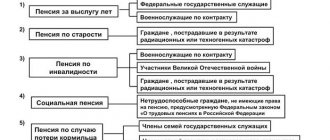Can a pensioner be fired due to redundancy?
Information
Until 1992, a labor code was in force, which allowed the enterprise administration to dismiss an employee after his age approached the retirement limit. Based on the new norms regulating the relationship between the employer and employees, the citizen retains the right to work.
Pensioners, like other employees, may be laid off. The dismissal procedure takes place on a general basis. All actions of the personnel department comply with the provisions of legal norms.
| The legislative framework | |
| Name of the law, article number | What is the article talking about? |
| Constitution of the Russian Federation, art. 37 | The article talks about the right of every citizen to work. |
| Federal Law No. 79 (30.12.2015) | A citizen of the Russian Federation who has reached 65 years of age can extend the age limit to 70-75 years by mutual agreement with the employer. |
| Labor Code of the Russian Federation, art. 180 | How is the dismissal procedure for job reduction carried out? |
| Labor Code of the Russian Federation, Article 81 Part 1 Clause 2 | Termination of an employment contract on the basis of staff reduction. |
| Federal Law No. 400 | Having reached the age limit, an employee can continue working without applying for a pension, which provides for an increase in the coefficient when recalculating future benefits. |
| Labor Code of the Russian Federation, art. 179 | The administration has the right to offer another vacancy to the reduced staff unit if the experience and skills of the retiree are valuable and in demand for the enterprise. |
Measures to reduce the number of staff units are most often triggered by the following events:
- modernization of production;
- change in the scope of activity;
- job reductions in order to optimize labor resources;
- reduction in the volume of products produced at the enterprise.
Important
Pensioners who have dependent minor children are not subject to dismissal.
The ban also applies to:
- guardians;
- disabled people of WWII and combat.
Reduction: is the benefit paid to pensioners?
The law defines categories of workers who should be given preference when preserving jobs in view of the upcoming staff reductions (with equal labor productivity and qualifications). These include (Part 2 of Article 179 of the Labor Code of the Russian Federation) workers:
- who are dependent on 2 or more individuals;
- who are the only workers in the family with independent income;
- received injury or occupational disease while working for this employer;
- who are disabled during the Second World War or during military operations to defend the Fatherland;
- directed by the employer to improve skills without interrupting work.
As you can see, pensioners are not included in a separate category of workers who have certain privileges when staffing is reduced. However, receiving an old-age pension or for other reasons is not also a reason for infringing on the rights of such an employee when determining which employees can be laid off first.
Is benefits paid when a pensioner is laid off? Yes, all payments and compensations due to an employee upon layoff are paid to the working pensioner in exactly the same manner as to all other employees whose employment contract (hereinafter referred to as TD) is terminated due to staff reduction.
For information on how the staff reduction procedure is carried out, read the article “The procedure for staff reduction - step-by-step instructions.”
See also the ready-made solution from ConsultantPlus “Is it possible to fire an employee during a bad epidemiological situation.” If you do not yet have access to the ConsultantPlus system, you can obtain it free of charge for 2 days.
Dismissal procedure
Due to the fact that a working pensioner is an ordinary staff member, the dismissal procedure is carried out in accordance with the general requirements of the law.
The actions of the administration represent a certain algorithm, following which many mistakes can be avoided.
- The director of the company, together with the heads of structural divisions, holds a meeting at which an official decision is made to change the staffing table.
- Based on the decision made, the commission members issue an order. The text indicates the need to reduce certain staffing positions, the names of positions, the names of employees and the date of execution of the order.
InformationThe list of those affected by reduction is compiled by the heads of departments, but is approved by all members of the commission, including the director.
- According to the legal framework, employees included in the list are given a written notice of the administration’s intentions 2 months before the date of execution of the order.
- If there are vacancies at the enterprise that correspond to the qualifications of the employee who was laid off, he is offered a new position. In this regard, retirees have priority, because their experience and professional level are of great value to the company.
AttentionOne of the important conditions for the possibility of transfer is good health.
- Simultaneously with notifying the employee of the upcoming layoff, the manager notifies the trade union organization of the upcoming changes, as well as the employment service.
- All employees included in the layoff list are given a written notice against their signature.
- In order for qualified employees, such as retirees, to continue to use their accumulated experience, the administration offers an alternative vacancy. The pensioner confirms his disagreement to renew the employment agreement with his signature in the act, which is drawn up in the event of refusal to accept the administration’s offer.
AttentionHe retains the right to resign early while maintaining benefits for the remaining period.
- Two months after receiving the written notice, a dismissal order is issued. The wording indicates the reason - reduction.
- The dismissed employee is given documents (including a work book) and payment funds. The process of transferring papers and funds is recorded in personnel journals and accounting statements.
Benefit for the third month for a pensioner: to pay or not
If a laid-off employee has not found a new job within the third month after the layoff, then he is entitled to additional compensation (Article 178 of the Labor Code of the Russian Federation). But this issue about pensioners has not been resolved to this day. What should an employer do if even legislators have not reached a consensus on the dispute over whether benefits are paid when a pensioner is laid off for the third month of unemployment?
Most officials are of the opinion that if a pensioner is laid off, no additional compensation is due for the third month, since a pensioner is a socially protected category of the population, and he is guaranteed payment of a pension (for old age, length of service and on other grounds). But the opinion of officials will not prevent the pensioner from going to court and, possibly, obtaining payments in his favor. And if he proves his case in court, then the employer faces administrative, financial and even criminal liability (Article 236 of the Labor Code of the Russian Federation and Parts 6, 7 of Article 5.27 of the Code of Administrative Offenses of the Russian Federation, Article 145.1 of the Criminal Code of the Russian Federation).
So what should you do: pay or not pay?
There is a solution: the basis for assigning compensation for the third month of unemployment is the corresponding decision of the Employment Service. And if representatives of the Employment Service recognized the dismissed pensioner as unemployed and issued an official decision of the established form, then the money will have to be paid.
If the employer fundamentally disagrees with the position of the territorial Employment Center, then he can challenge the decision in court.
Payments and benefits
The date indicated in the notice of reduction is the last working day. It is then that the employee is given documents and payment funds for the period worked. The law also provides for the payment of benefits in the amount of average monthly earnings, and this amount is retained by the pensioner for two months.
The benefit is, in essence, material support for the fired person during the period of searching for a new job. If this appears in the first month after dismissal, then the employer has the right to refuse the next tranche.
The total amount issued includes:
- wages;
- severance pay;
- compensation for unclaimed leave.
Based on the internal regulations of the organization, a reduced employee may be awarded an additional amount for length of service or other achievements.
Attention
Payments to a pensioner with whom the employment agreement is terminated early are carried out in accordance with legal acts, namely Art. 178, 180 Labor Code of the Russian Federation.
Within 2 weeks, a redundant employee can register with the employment service, then it becomes possible to receive severance pay for the third month.
Dismissal of a pensioner due to staff reduction and related payments
Is it legal to fire a pensioner?
When the time approaches retirement age, many people have a question about what payments they are guaranteed upon dismissal, as well as under what conditions the organization can dismiss them.
In this case, a person cannot have any concerns, since the law is on the side of the pensioner. Today, there is no reason to dismiss an employee receiving a pension only because he has reached a certain age.
Such actions are considered illegal, contrary to the proclaimed principle of equality in accordance with Part 1 of Article 2 of the Labor Code of the Russian Federation. This may also be considered discrimination in accordance with Article 3 of the Labor Code.
Therefore, if a specialist works and receives a pension, does his job properly, complies with internal labor regulations and does not behave inappropriately (does not commit guilty actions that discredit the company and cause losses), then there are no legal grounds to dismiss the employee, and there will be can not.
Working off
According to the regulations described in labor legislation, the administration informs the employee in writing about the upcoming reduction of his position. For two months from the date of delivery of the notice, the previous functional duties are to be performed.
But pensioners can exercise the right to early dismissal by drawing up an application with a corresponding request. If the employer agrees to terminate the employment agreement, the employee retains the right to receive severance pay and other payments provided for by legal acts, and is also paid a sum of money proportional to the period remaining from two months.
Attention
Pensioners have a pre-emptive right to terminate their employment relationship with their employer early, referring to Art. 81, clause 2, part 1 of the Labor Code.
If early dismissal is denied, the pensioner must work for the required period (2 months). An alternative option is voluntary resignation. The employee submits an application indicating the reason - retirement. The Labor Code allows you to resign in this case without working on the day specified in the application. But at the same time, a pensioner should not count on the severance pay due to the staff being reduced.
What payments are due to pensioners in case of staff reduction?
The labor legislation of the Russian Federation protects the interests of both employers and their employees. Therefore, if an employer dismisses a pensioner due to staff reduction, he is also obliged to provide him with payments as compensation. The rules that the employer must obey in the process of calculating the said monetary benefits are also prescribed in labor legislation.
To be specific, compensation for a pensioner laid off due to redundancy must be equal to the amount of his average salary. It is calculated in proportion to the amount of time remaining until the end of the warning period. It is a mistake to believe that when staffing is reduced, dismissed pensioners are paid only severance pay. The Labor Code of the Russian Federation also provides for other payments that are due to such an employee.
Entry in the work book
The text of the entry in the work book must match the contents of the dismissal order. It is entered by the personnel officer after the introductory signature of the pensioner under the order of the manager.
On the last working day, an entry is made in the work book, including the following data.
- Record number;
- Reason for dismissal (dismissal due to layoff);
- Link to the article of the code (Article 81, clause 2 of the Labor Code of the Russian Federation);
- Date of termination of the employment agreement;
- Signature of the head of the enterprise;
- Seal of the organization.
Attention
The order and entry entered into the work book must necessarily contain references to the article of the Labor Code of the Russian Federation.
Is it possible to appeal dismissal?
The list of redundant staff is compiled not on the basis of age category, but on professional suitability, taking into account changes planned in production. Therefore, people of different ages can get into it. The pensioner has the right to challenge management’s decision in court, citing the following reasons:
- belonging to a preferential category of persons (presence of guardianship, status of a combat disabled person, etc.);
- inability to exercise the priority right to stay at the enterprise or take a vacant position;
- if the notification deadlines were violated during the staff reduction procedure;
- if an incorrect entry is made in the work book;
- upon refusal to pay severance pay.
The reason for proceedings in state authorities is often the requirements of Art. 179 of the Labor Code of the Russian Federation, which clearly states that employees of retirement age should enjoy the preferential right to transfer to another division of the enterprise. A high qualification level and experience are always a priority for any organization. However, the proposed vacancy must be commensurate with the qualifications of the unit being reduced.
Important
Dismissal is considered illegal when the staffing table remains unchanged. This decision by management contradicts the regulations for processing documents related to reducing the number of staff.
Privileges and guarantees
When carrying out the procedure for downsizing or liquidating a company, persons receiving state subsidies are entitled to privileges. The employer must provide pensioners with the following guarantees:
- do not discriminate against individuals based on age, provide equal rights to work for older citizens compared to younger employees;
- take into account the qualifications, experience, knowledge and skills, high labor productivity of a pensioner when determining the list of employees subject to personnel reduction;
- provide additional unpaid leave out of turn for up to 2 weeks to a person receiving old-age benefits, upon his request;
- pay all subsidies established by the state when the number of workers in the company is reduced;
- do not force a pensioner to work for the required 2 weeks if the citizen decides to resign of his own free will.
Preemptive right to remain on staff of the enterprise
According to the provisions of the Labor Code of the Russian Federation, an employee receives an advantage when remaining in his position during the procedure for optimizing production at the enterprise, if he is highly qualified and performs duties in accordance with the provisions of the employment agreement. If a person of retirement age is actively working in production and his work is highly productive, then the company management must take these factors into account when compiling a list of employees to be laid off.
- How to file a tax return
- Why you should sleep on your left side if you have stomach pain
- Kitchen knives - how to choose based on blade and handle material, manufacturer, type of sharpening and price
Which pensioners are prohibited by law from being laid off?
People belonging to socially unprotected categories of citizens who have served the Russian Federation and the enterprise have the right to remain in their previous position while minimizing the size of the company for objective reasons. These include the following Russians receiving a pension:
- those who took part in battles on the battlefields of the Great Patriotic War (WWII);
- those who received injuries in the Second World War that led to disability;
- having disabilities due to participation in other battles in hot spots;
- injured during work, but able to perform job functions in accordance with the provisions of the employment agreement;
- providing for minor dependents;
- falling under the definition of a privileged group that is not subject to reduction, in accordance with the provisions of the collective agreement;
- who are guardians of minor children, provided that they are the only employed family members.









